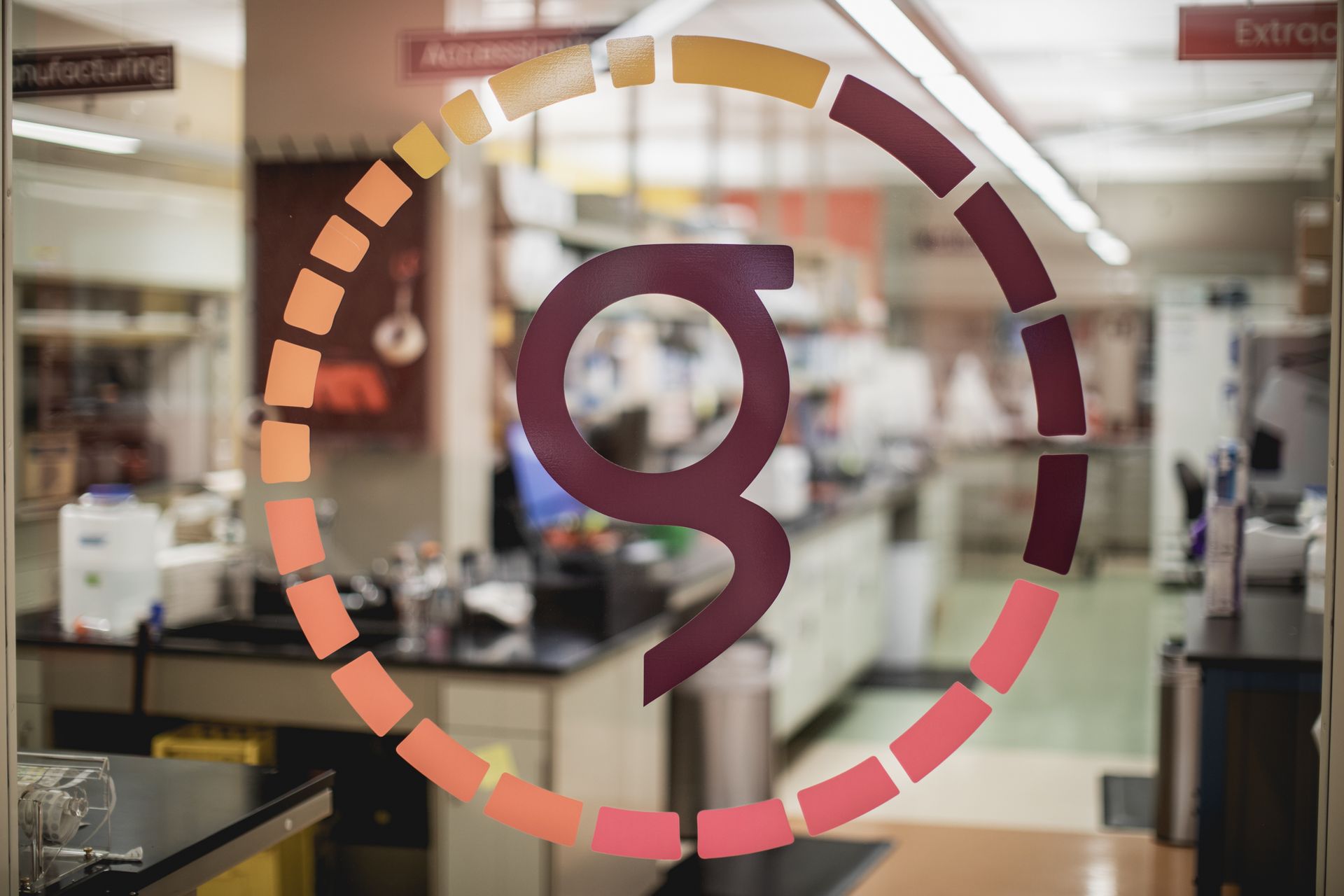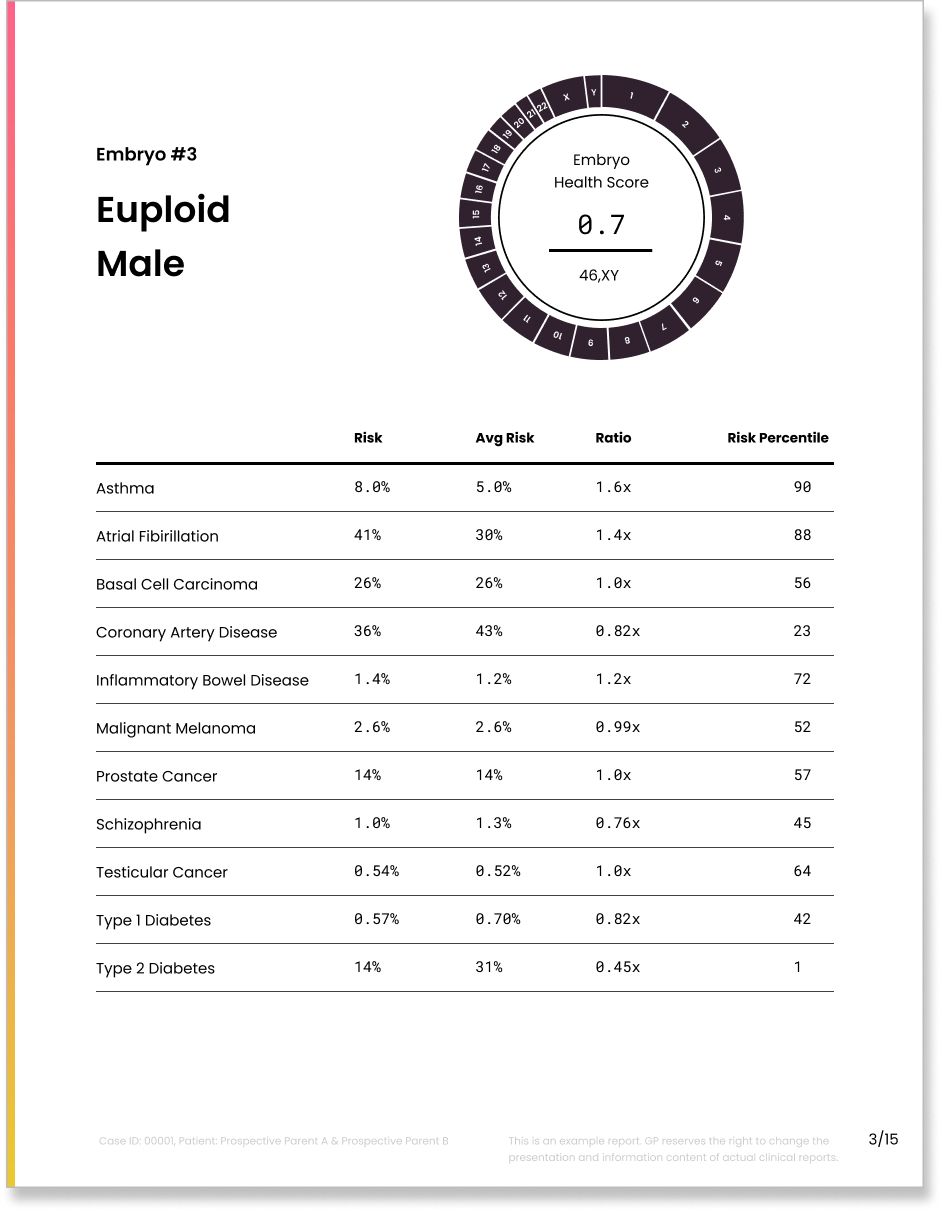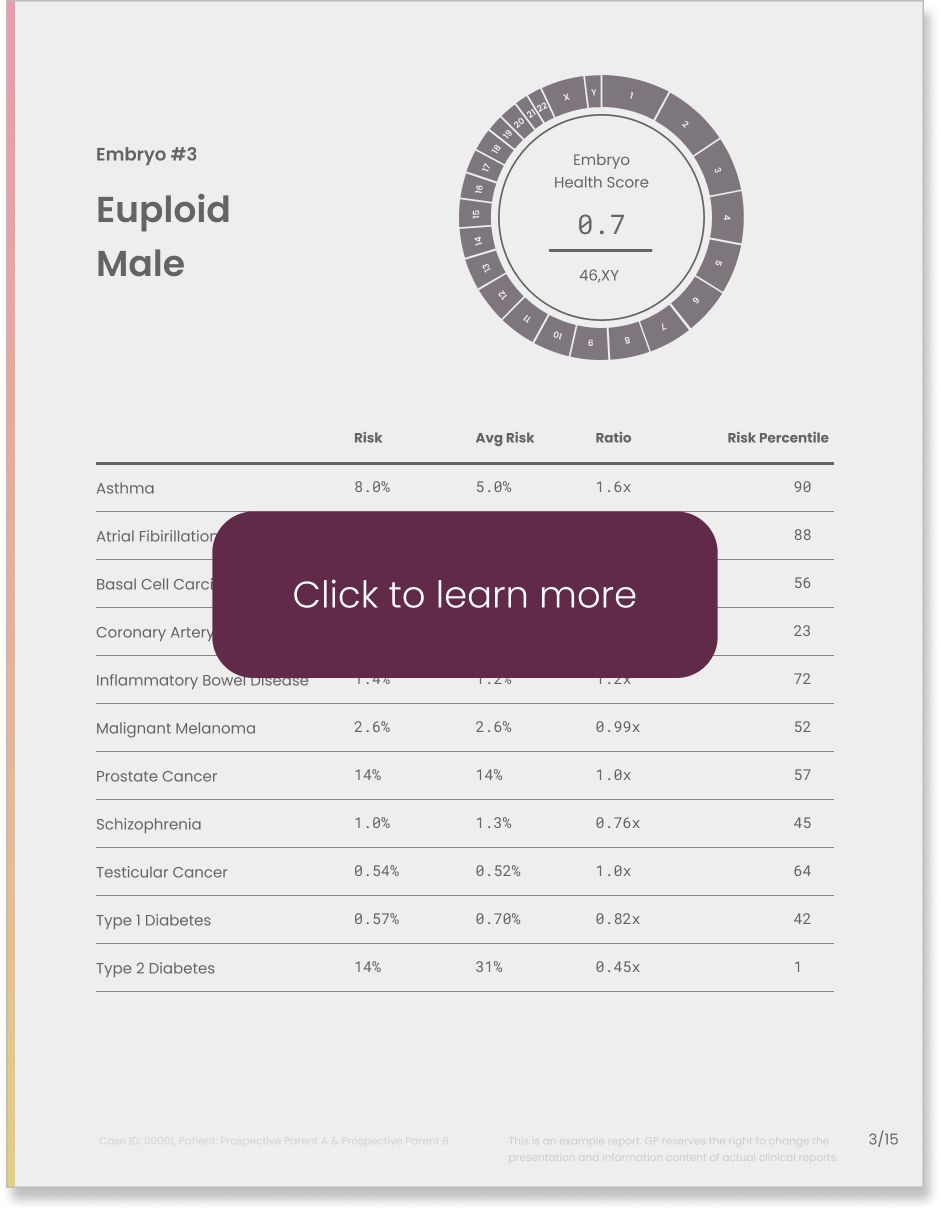Embryo Health Score® Test
Reduce disease risk with the Embryo Health Score
The LifeView Embryo Health Score Test (EHS) is designed to reduce the risk of disease. It estimates the chance in each embryo to develop common conditions such as diabetes, certain cancers, schizophrenia and heart disease. This important health information helps you and your clinician make an informed decision about which embryo to choose for transfer.
The Embryo Health Score may be of particular interest if:
- You are concerned about certain risks for polygenic conditions based on your personal or family history
- You want to screen your embryos for common diseases to identify embryos with lower risks
- You are already including PGT-A in your IVF plan
Risk Reduction Calculator
reduction*
*assuming selection from 5 euploid embryos of European ancestry. Read more about risk reduction here.
Why Choose LifeView Testing?

“Being offered LifeView
EHS was a
game-changer for us. I have
type I diabetes and I
would do anything to not pass that along”
— Brennan Cassidy,
IVF father and LifeView customer
01
LifeView is the first and leading platform in the world to offer polygenic testing for embryos.
02
The Embryo Health Score Test is a completely unique test and is the only polygenic test that is designed to reduce multiple disease risks
simultaneously.
03
Our highly experienced team of bioinformatics, genetic and clinical experts are involved through the entire testing process.
How to Order the Embryo Health Score Test
Talk to your clinician
Ask your IVF provider about the LifeView Embryo Health Score Test. You may want to make sure that LifeView testing is offered when you choose your IVF clinic.
Test setup
Your clinician orders the test and our client specialists work closely with you and your IVF team to address your specific needs. A pre-test genetic counseling is always included with the EHS.
Biopsy and analysis
Embryos are produced through an IVF cycle. A small sample from each embryo is sent to us for analysis. This is the same biopsy as is used for PGT-A.
Results
The results are sent to your IVF provider so they can discuss them with you. Post-test counseling with one of our genetic counselors is also available at no extra cost.
A Deeper Dive into the Embryo Health Score
Click to learn more about the report
How does the Embryo Health Score work?
The LifeView Embryo Health Score Test is designed to help select an embryo for transfer using health information. Specifically, LifeView EHS assesses the genetic risk for polygenic diseases, that is disorders whose risk is influenced by many genes. Most conditions with a genetic component are polygenic, such as diabetes, cardiovascular diseases and certain cancers.
The EHS estimates the risk of many such polygenic conditions and combines all the information into a single health score, the EHS. Choosing the embryo with the best EHS has been scientifically validated to reduce these risks, with up to 40% for multiple diseases simultaneously. LifeView EHS also provides individual disease risk estimates for each embryo. This information may be helpful if there is a concern about a particular condition based on your medical or family history.
LifeView EHS helps you compare risk scores among your own batch of embryos. Due to natural genetic variation, all embryos have different genetic disease risks, even embryos created from the same parents or gamete donors. LifeView EHS uses this natural variation – without altering the embryos in any way – to determine which of your embryos have higher or lower risks of certain conditions compared to the other tested embryos. This information can then be used to choose which embryo to prioritize for transfer.
How well does the Embryo Health Score work?
It has been scientifically validated using hundreds of thousands real-life health records that a higher Embryo Health Score corresponds to lower disease risks. Most notably, this has been shown in over 40,000 real siblings late in life. The specific benefit of the EHS for an individual case varies based on multiple factors, such as number of tested embryos, genetic ancestry, family history and specific condition.
You can explore how much the EHS reduces different disease risks in these real-life databases with our risk reduction calculator and learn more about the EHS benefit and how it is measured.
| AFR | AMR | EAS | EUR | SAS | |
|---|---|---|---|---|---|
| Asthma | |||||
| Atrial Fibrillation | |||||
| Basal Cell Carcinoma | |||||
| Breast Cancer | |||||
| Coronary Artery Disease | |||||
| Inflammatory Bowel Disease | |||||
| Malignant Melanoma | |||||
| Prostate Cancer | |||||
| Schizophrenia | |||||
| Testicular Cancer | |||||
| Type 1 Diabetes | |||||
| Type 2 Diabetes |
AFR - African ancestry
AMR - Latin American/Indigenous people of the Americas
EAS - East Asian ancestry
EUR - European ancestry
SAS - South Asian ancestry, including the Middle East and parts of North Africa
Which diseases is the EHS screening for?
The EHS is screening for multiple diseases at the same time and our current list of available diseases is shown in the table.
The exact list of diseases available to you depends on your embryos' genetic ancestry. Please contact us if you have any questions regarding your ancestry.
The role of ancestry
Genetic ancestry is an important component of EHS screening. The majority of data available for polygenic risk score calculations – the technology behind the EHS – has historically included mostly individuals with European ancestry. This impacts both development and validation of polygenic risk scores. Specific diseases are included in the LifeView EHS report for each ancestry only if they meet our strict validation requirements. Therefore, while individuals from all ancestral backgrounds may choose to utilize and benefit from EHS, the specific diseases that are available for screening and the accompanying risk reductions will vary based on ancestry. We continuously collaborate with scientists around the world to collect and analyze data from individuals of all ancestral backgrounds to make this testing more equitable for all. In the meantime, if you have questions about a specific condition based on your ancestry, please contact us on gene@lifeview.com.
Have Questions?
Find Answers Here.

Does the number of tested embryos matter?
Yes. LifeView EHS is not a diagnostic test, but a screen designed to compare disease risks among a group of embryos. Statistically, the more embryos available for comparison, the higher the chance of identifying embryos with bigger differences in polygenic risk scores, allowing for more impactful relative risk reductions. However, this test is validated to provide benefits even when selecting among two embryos.
Does LifeView EHS require an additional biopsy sample?
No, LifeView EHS is performed together with PGT-A (aneuploidy) screening. Only one embryo biopsy – the same as is used for a PGT-A test – is needed to include LifeView EHS in your testing plan.
Are LifeView EHS scores provided for aneuploid embryos?
No, health score data is not provided for aneuploid embryos. Extra or missing genetic information detected in aneuploid embryos does not allow for reliable calculations and since aneuploidy is associated with an increased chance of poor outcome, regardless of health score data, this information is not required for informed decision making.
Can I speak to a genetic counselor about this test?
Absolutely! Once your clinician submits the test order to our laboratory, you will be provided with information to schedule a virtual genetic counseling appointment with one of our experienced genetic counselors. The goal of this session is to review the benefits and limitations of LifeView EHS, answer your questions and help you make an informed decision about including LifeView EHS as part of your preimplantation genetic testing plan.
Can LifeView EHS be completed if embryos are created with an egg and/or sperm donor?
Yes, LifeView EHS can be completed with DNA from egg and sperm donors. We will assist your IVF center in coordinating this sample to our laboratory.
Are parental saliva samples needed for LifeView EHS?
Yes, parental DNA information is used to help analyze the DNA in each embryo. In most cases, after LifeView EHS testing is ordered, a saliva kit, which includes easy to follow collection instructions, is shipped out to your home.
Can embryos be compared over more than one cycle?
Yes, as long as embryos are screened using the same analysis version, LifeView EHS scores over multiple cycles can be compared directly. LifeView EHS is a new and rapidly developing technology and we do have regular updates to improve and expand the testing platform. If there is a test update between cycles, we will update all cycles to the latest version upon request at no additional fee (excluding embryos that were already transferred).
Does ancestry impact the EHS report?
Yes, ancestry is an important component of EHS screening. The majority of data available for polygenic risk score calculations has historically been based on individuals with European Caucasian ancestry. This impacts both development and validation of polygenic risk scores. Specific diseases are included in the LifeView EHS report for each ancestry only if they meet our strict guidelines. Therefore, while individuals from all ancestral backgrounds may choose to utilize and benefit from EHS, the specific diseases that are available for screening and the accompanying risk reductions will vary based on ancestry. We continuously collaborate with scientists around the world to collect and analyze data from individuals from all ancestral backgrounds to make this testing more equitable for all. In the meantime, if you have questions about whether a specific condition is available for screening based on your ancestry, please contact gene@genomicprediction.com.
Is the EHS a diagnostic test?
No, it is not. The EHS cannot say which embryo would get a certain disease and which would not. It estimates the genetic risk of the disease. As such it indicates which embryo is less likely to develop the disease and therefore recommended for transfer. No embryo is ever excluded due to EHS, it simply recommends the one expected to have lowest risk of disease.
Does the EHS change the DNA? Is it gene editing?
No, the EHS does not alter the DNA in any way. It assesses the disease risk in the already existing DNA. It then suggests which embryo to transfer, which you can choose to follow or not. This is very different from gene editing.
Should embryos ever be discarded based on the EHS?
The EHS is designed to inform the choice of which embryo to transfer. It is not designed to exclude embryos. The EHS offers you a suggested priority, based on health information.
If any question you have is not answered here, please feel free to email gene@lifeview.com




